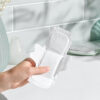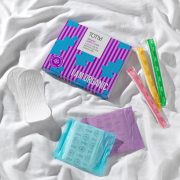Sustainability is a big talking point due to the damage everyday items are having on our planet. Here, we’re looking at the health concerns, or more specifically how plastic can disrupt hormones. Plus, scroll to discover our £2 switch kits!
As a society, we’re becoming more aware of how plastic is damaging the environment. Thanks to recent campaigns and statistics, our eyes have been opened. This has sparked a desire for change. But did you also know that plastic contains hormone-disrupting chemicals? These have potential long-term health risks, so it’s super important to know what they are and how to avoid them.
It’s easy to disregard something as ‘harmless’ if you can’t necessarily see it. But it’s important to pay attention to the invisible chemicals in plastics. What are these I hear you ask? Let’s find out.
Phthalates
Phthalates are often associated with the clean beauty movement; therefore, you may have heard of them before. Phthalates are present in soft plastics. They are also found in a lot of cosmetics such as perfumes, nail polish and soap.
Phthalates affect testosterone and oestrogen hormones. When phthalates enter your body, they alter levels of testosterone. This is the hormone responsible for bone strength, energy levels, well-being and your sex drive. Altered levels of testosterone can leave you feeling lethargic, low in energy and with a poor libido. You don’t need any of this on your period, right?
Phthalates also block the production of oestrogen. This is a powerful hormone. One that helped us develop from girls to women. It’s actually oestrogen you can thank for making your boobs grow as you got older! Oestrogen also regulates your menstrual cycle. Exposure to phthalates can affect natural processes such as puberty, uterine functions and mental well-being.
I’m sure you can see why it’s super important to limit our exposure to this chemical!
BPA
This chemical is most commonly found in plastic water bottles and containers. BPA is an EDC, meaning it interferes with our hormonal system by mimicking or blocking naturally occurring hormones. This affects the bodies’ response to stress, as well as metabolism, reproduction and growth/development. You can read more about EDCs here.
How to avoid these
A plastic-free world would be an ideal scenario. And fortunately, more and more plastic alternatives are now slowly becoming available. But, there are also simple swaps you can do to cut your plastic usage and reduce your exposure to the chemicals in plastics.
BPA-free
The effects of BPA on health has become more recognised. As a result, reusable water bottles and plastic containers labelled BPA-free are now more widely available. But, you can also opt for glass containers and bottles to reduce your exposure and be kinder to the environment.
Avoid heating plastic containers
BPA can leak from plastic containers. Avoid heating up food that is in a plastic container as this chemical can leak into your food. Generally, convenient meals are not only bad for the environment (due to plastic packaging) but they are not always a healthy option. You can read more on how processed food affects hormones here.
Fragrance-free
As mentioned before, Phthalates are also found in perfume and soaps. You can reduce your exposure to these by opting for fragrance-free products. It’s important to consider your period care when opting for fragrance-free as well. Regular tampons and pads contain unknown fragrance and perfumes. The vagina is one of the most absorbent parts of the body, so you can imagine how important it is to be aware of what is in your period care products.
Cardboard applicators
Most tampons have a plastic applicator, which increases your exposure to the chemical BPA. The good news is, there are alternatives out there. You can switch to non-app tampons or use a cardboard applicator. These can be trickier, but we’ve covered all the reasons you should make the switch and tricks to master them here.
Keen to change up your period care? Discover our £2 switch kits which contain a mix of our organic cotton tampons, pads and liners! Ideal to ‘give organic a -go’ on your next period.
Photography via: @rawpixel





